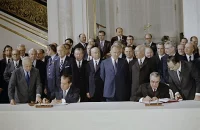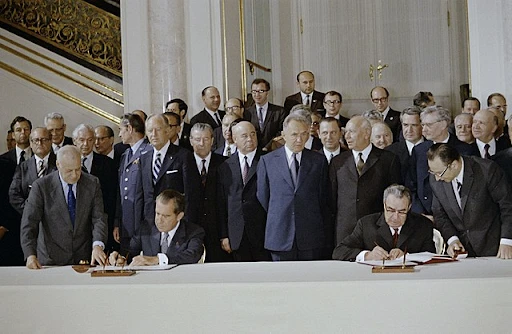The Cold War started after the end of World War II and lasted until the fall of the Soviet Union. Filled with arms races, proxy wars, and tense negotiations, the Cold War would give foreign service officers a glimpse into different negotiation tactics and styles.

Raymond F. Smith was a consular officer in Moscow from 1976 to 1979, and he served as a part of the Office for Bilateral Affairs on the Soviet Desk from 1982 to 1984. During his time serving in these positions, Smith observed the differences between the negotiating tactics of the United States and the Soviet Union. In this “Moment in U.S. Diplomatic History,” we see that Smith acknowledges that these contrasts could have resulted from differences in political culture, educational atmosphere, and cultural/societal distinctions.
Raymond F. Smith also served in Tunisia, Ivory Coast, and South Africa.
Raymond F. Smith’s interview was conducted by Charles Stuart Kennedy on January 14, 2009.
Read Raymond F. Smith’s full oral history HERE.
For more Moments on U.S. and USSR bilateral relations click HERE.
Drafted by Anais Boyajian
ADST relies on the generous support of our members and readers like you. Please support our efforts to continue capturing, preserving, and sharing the experiences of America’s diplomats.
Excerpts:
“I wanted to look at the political culture and how that affected how people in the Soviet Union learned how to negotiate, what their expectations of negotiations were and what was important to them in a negotiation.”
United States vs. Soviet Union:
SMITH: I wanted to look at the political culture and how that affected how people in the Soviet Union learned how to negotiate, what their expectations of negotiations were and what was important to them in a negotiation. And I wanted to write a book that would help people understand this better so that you could either get a better outcome in your negotiations or, if you weren’t getting the responses you expected you understood a little bit better why you were not getting the responses you expected.
Q: Well, in the first place, was there a Soviet diplomatic academy where they taught this style or did this come from the Russian soil?
SMITH: I would say it came from the Russian political culture as opposed to the Russian soil and I don’t think they were taught techniques of negotiation in their equivalent of a diplomatic academy, but they weren’t taught the fundamental things that they learned in their political culture about negotiating. By that I mean three of the chief things that I identified that affected their style of negotiations was what I called “authority, risk avoidance, and control.” And their understanding of these three things had an enormous impact on how they negotiate and Americans and probably Western Europeans in general, have a very different gut level feeling about these things than Soviets, and specifically Russians, do. And that would often lead people to go astray in negotiations.
For example, one really interesting book on this subject was called “The Russian Mind,” and in that the author makes the point that the Russians view authority relationships as all or nothing. That is, you either have the authority, in which case you’ve got it all, or you don’t have the authority, in which case you have none. So in an authority relationship you’re going to be either the all or the none. And that’s their expectation. In a personal relationship they expect complete equality in their relationship.
“In a high context culture you get much less of your information from the spoken or written word and much more from the context in which that spoken or written word is presented.”

The influence of culture on negotiation:
SMITH: The Russian wants to talk about the shape of the table.
Q: Yes.
SMITH: Yes, exactly. They’re not ready to talk about the issue. Another way of putting part of this is the distinction between a high context culture and a low context culture. I don’t know if you’re familiar with that.
Q: No, I’m not.
SMITH: Alright. Basically somebody wrote a book on this and I think it’s an interesting concept. What this person argues is that we Americans in particular live in a very low context culture. That is, we put a lot of reliance on and get most of our information from the spoken and the written word. That’s where we get our information from. That’s low context. In a high context culture you get much less of your information from the spoken or written word and much more from the context in which that spoken or written word is presented. In the most trivial sense it could be body language and that’s one of the things of course you’re taught in negotiations to pay attention to. Americans need to be taught that. We need to be taught to get out of our low context way of thinking and pay attention to contextual issues. For Russians context is a much higher priority and they naturally, they don’t have to be taught, to look at context. They can no more not look at context than we could not look at the written word.
“We don’t necessarily understand how to get to closure in a negotiation with a culture different from ours.”
Learning to communicate cross-culturally:
Q: I would imagine, I mean, when you’re looking at one style then you have to in a way contrast it to the other side which would be outside, wouldn’t you? And what did you see in the American style that was dominant?
SMITH: Well, to come back to this idea of low context. I mean, we are very focused in our negotiations on the written word or the spoken word, on what is said. We tend to try to put forth a proposal that we think is fair and then if the other side is dismissive of it, contemptuous of it we get mad because we spent all this time trying to be fair before we ever got there. And so now we’re mad and they’re just doing what comes natural.
We don’t necessarily understand how to get to closure in a negotiation with a culture different from ours. In many ways for a Russian the assumption is that if the deal is good enough for me obviously it’s not good enough for them and so they have to ask for more. We get mad if they keep asking for more. There’s nothing to get mad about. That is simply their way of testing what the real limits are. And sometimes you have to fold up your papers and get up and head for the door before they’re convinced that this is really the final offer. And when they’re going back to their superiors they have to be able to say there is nothing more we can get out of these people; I pushed it as hard as I possibly can. And they have to believe that at a gut level. How do you get them to believe that? As I said, sometimes you have to literally or figuratively fold your papers up in your folder and get up and head for the door. And then they’ll call you back, more likely than not, either immediately or shortly thereafter.
TABLE OF CONTENTS HIGHLIGHTS
Education
BA in Political Science, Temple University, 1959, 1962–1965
United States Army, 1959–1962
National Defense Education Scholarship, Northwestern University, 1967–1970
Joined the Foreign Service 1969
Washington, DC—Sudan Desk Officer 1972–1974
Moscow, Russia—Consular Officer 1976–1979
Washington, DC—Officer for Bilateral Affairs in Soviet Desk 1982–1984

